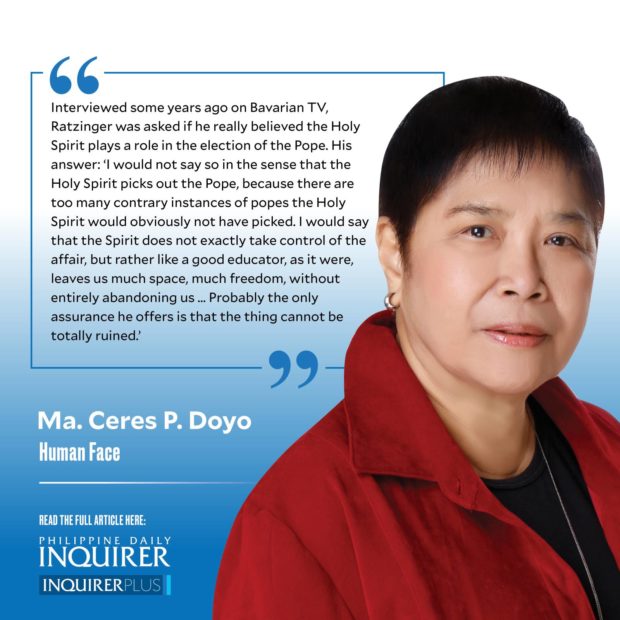Scrollback: ‘Ein Papst aus Deutschland’
Pope Emeritus Benedict XVI (Joseph Ratzinger, German) died on Dec. 31, 2022 at the age of 95 and was laid to rest yesterday amid solemn rites at the Vatican City. As we all know, he resigned from the papacy in 2013 for health reasons and was succeeded by Pope Francis (Jorge Bergoglio, Argentinian).
Here are excerpts from my piece on his election as Pope Benedict XVI in 2005. He succeeded the charismatic Pope St. John Paul II (Karol Wojtyła of Poland).
2005: I kept switching to Deutsche Welle (DW), the German channel on cable TV, right after Cardinal Joseph Ratzinger was elected Pope last week. What was it like for the Germans, the predominantly Catholic Bavarians especially, to have one of them become Papst Benedikt XVI? The crawler on the TV screen said “Ein Papst aus Deutschland” (the Pope from Germany).
DW had first crack at the butcher, the baker, and the candlestick maker, so to speak, in Ratzinger’s hometown in Bavaria. Now, cookies and bread are being named after him.
DW showed tabloids with screaming headlines saying “Papa Ratzi,” “German Shepherd,” “God’s Rottweiler,” and something about the Hitlerjugend, to which Ratzinger was conscripted in his youth.
Bavarians are supposed to be warmer in disposition compared with Germans from the north. Several of my mentors in college were German Benedictine nuns who hailed mostly from Bavaria. I can name all of them, with their family names.
Shock, joy, acceptance. These were some reactions I solicited in the aftermath of Ratzinger’s election.
“When I heard his name mentioned, my heart sank,” said American Maryknoll sister and theology professor Helen Graham the morning after the announcement. She’s had little sleep since the news broke the night before, she confided.
To console those who felt the same way, Graham reminded: “Ratzinger’s role in the Sacred Congregation for the Doctrine of the Faith differed from this new role as Pope which is to focus on unity.”
Ratzinger was the late Pope John Paul II’s enforcer of orthodoxy, the one who cracked the whip on doctrinal matters. He authored the “Letter to the Bishops of the Catholic Church on the Collaboration of Men and Women in the Church and in the World” which was hugely criticized by women’s rights advocates. Rep. Risa Hontiveros’ maiden speech in Congress last year was a stinging criticism of Ratzinger’s letter.
Graham was not entirely distraught. “I have some hope that this new role would take him in new directions. Now he has a different agenda, a different job, which is to be a symbol of unity.”
Interviewed by the Inquirer just before the conclave, Graham had said she “was saddened by the opposition to even discussing the issue of women’s ordination, the stifling of imaginative theological thinking, and the inability to make any change whatsoever in reproductive issues that profoundly affect the lives of women.’” Graham is a proponent of the use of inclusive language in the liturgy.
I noticed that John Paul II’s funeral and Benedict XVI’s installation liturgies were grandly, hugely, almost entirely all-male. Even the choir was all-boys.
“I was very happy,” Bishop Rolando Tria-Tirona of the recently devastated Prelature of Infanta told the Inquirer. “I hope to see him put back moral, spiritual, and pastoral sense in Western Europe where the church is dwindling. There has been too much relativism, a kind of wishy-washiness there.”
In his homily before the conclave, Ratzinger had warned about relativism. Tirona added the new pope might leave his old public persona behind. “When you are in another position, you will shed your old role. You have greater perspective.” Tirona and Ratzinger had met briefly in the past, and Tirona was impressed by Ratzinger’s aura of humility.
And what does Sister Mary John Mananzan, Germany-educated prioress of the Missionary Benedictine Sisters in the Philippines, known feminist and women’s rights advocate here and abroad, founder of the Institute of Women’s Studies of St. Scholastica’s College, and one of the driving spirits behind the Ecumenical Association of Third World Women Theologians? “The only thing I want to say is: I believe in the Holy Spirit more than I believe in my human judgment. That is why I am accepting Pope Benedict XVI in faith. I have nothing more to add.”
Interviewed some years ago on Bavarian TV, Ratzinger was asked if he really believed the Holy Spirit plays a role in the election of the Pope. His answer: “I would not say so in the sense that the Holy Spirit picks out the Pope, because there are too many contrary instances of popes the Holy Spirit would obviously not have picked. I would say that the Spirit does not exactly take control of the affair, but rather like a good educator, as it were, leaves us much space, much freedom, without entirely abandoning us … Probably the only assurance he offers is that the thing cannot be totally ruined.” I agree. Only I refer to the Holy Spirit as a she.
2023: And may it be so when the time comes for Pope Francis’ successor to be elected.
ead more: https://opinion.inquirer.net/160106/scrollback-ein-papst-aus-deutschland#ixzz7s2YqhnpL








